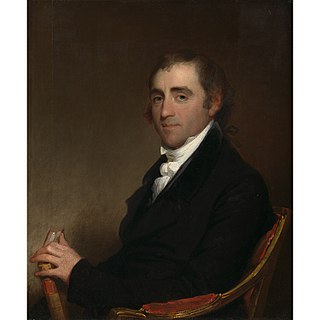A Quote by Alexander Hamilton
An over-scrupulous jealousy of danger to the rights of the people, which is more commonly the fault of the head than of the heart, will be represented as mere pretense and artifice, the stale bait for popularity at the expense of the public good.
Related Quotes
Perhaps there is no other knowing than the mere competence of the act. If at the heart of one's being, there is no self to which one ought to be true, then sincerity is simply nerve; it lies in the unabashed vigor of the pretense. But pretense is only pretense when it is assumed that the act is not true to the agent. Find the agent.
I am commonly opposed to those who modestly assume the rank of champions of liberty, and make a very patriotic noise about the people. It is the stale artifice which has duped the world a thousand times, and yet, though detected, it is still successful. I love liberty as well as anybody. I am proud of it, as the true title of our people to distinction above others; but . . . I would guard it by making the laws strong enough to protect it.
The truth is, that, even with the most secure tenure of office, during good behavior, the danger is not, that the judges will be too firm in resisting public opinion, and in defence of private rights or public liberties; but, that they will be ready to yield themselves to the passions, and politics, and prejudices of the day.
Heart weeps. Head tries to help heart. Head tells heart how it is, again: You will lose the ones you love. They will all go. But even the earth will go, someday. Heart feels better, then. But the words of head do not remain long in the ears of heart. Heart is so new to this. I want them back, says heart. Head is all heart has. Help, head. Help heart.
Liberalism is that principle of political rights, according to which the public authority, in spite of being all-powerful, limits itself and attempts, even at ist own expense, to leave room in the state over which it rules for those to live who neither think nor feel as it does, that is to say as do the stronger, the majority.
To handle yourself, use your head; to handle others, use your heart. Anger is only one letter short of danger. If someone betrays you once, it is his fault; if he betrays you twice, it is your fault. Great minds discuss ideas; average minds discuss events; small minds discuss people. He who loses money, loses much; he who loses a friend, loses much more; he who loses faith, loses all.
Let's not use the term democracy as a play on words which is what people commonly do, using human rights as a pretext. Those people that really violate human rights [the West] violate human rights from all perspectives. Typically on the subject of human rights regarding the nations from the south and Cuba they say, "They are not democratic societies, they do not respect human rights, and they do not respect freedom of speech".
Repentance out of mere fear is really sorrow for the consequences of sin, sorrow over the danger of sin — it bends the will away from sin, but the heart still clings. But repentance out of conviction over mercy is really sorrow over sin, sorrow over the grievousness of sin — it melts the heart away from sin. It makes the sin itself disgusting to us, so it loses its attractive power over us. We say, ‘this disgusting thing is an affront to the one who died for me. I’m continuing to stab him with it!’
The vested interests-if we explain the situation by their influence-can only get the public to act as they wish by manipulating public opinion, by playing either upon the public's indifference, confusions, prejudices, pugnacities or fears. And the only way in which the power of the interests can be undermined and their maneuvers defeated is by bringing home to the public the danger of its indifference, the absurdity of its prejudices, or the hollowness of its fears; by showing that it is indifferent to danger where real danger exists; frightened by dangers which are nonexistent.
The necessaries of life occasion the great expense of the poor. They find it difficult to get food, and the greater part of their little revenue is spent in getting it. The luxuries and vanities of life occasion the principal expense of the rich, and a magnificent house embellishes and sets off to the best advantage all the other luxuries and vanities which they possess ... It is not very unreasonable that the rich should contribute to the public expense, not only in proportion to their revenue, but something more than in that proportion.

































